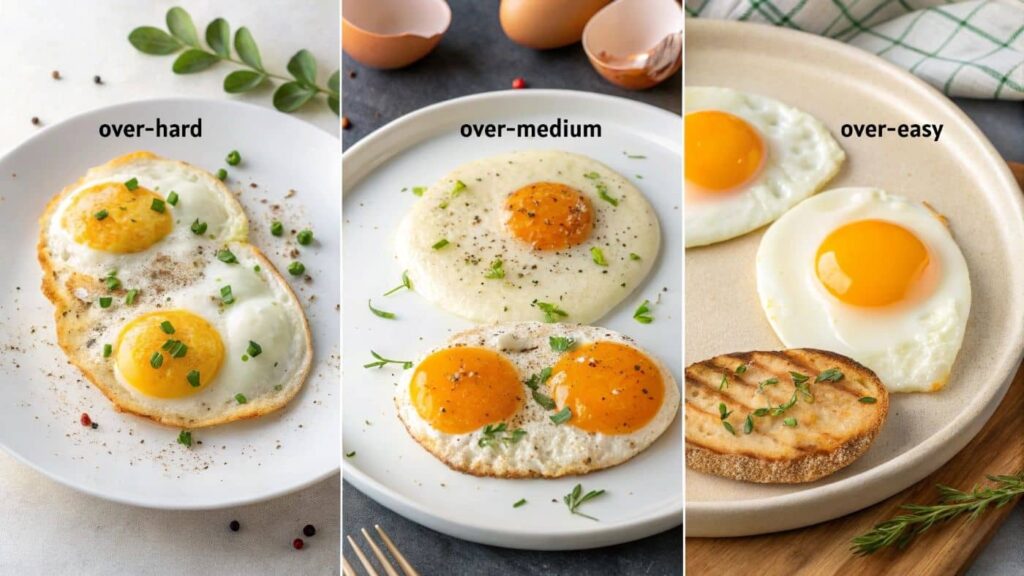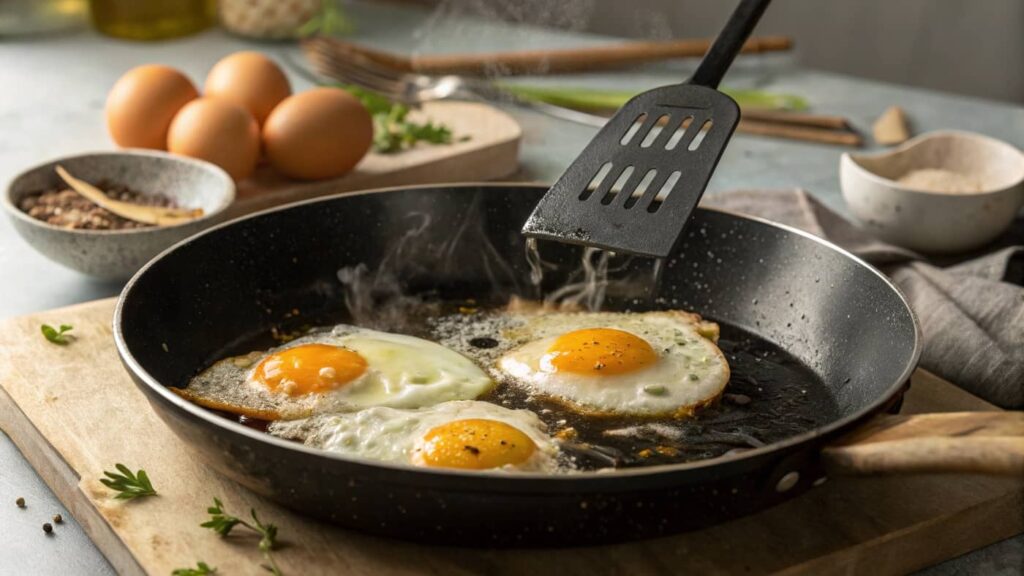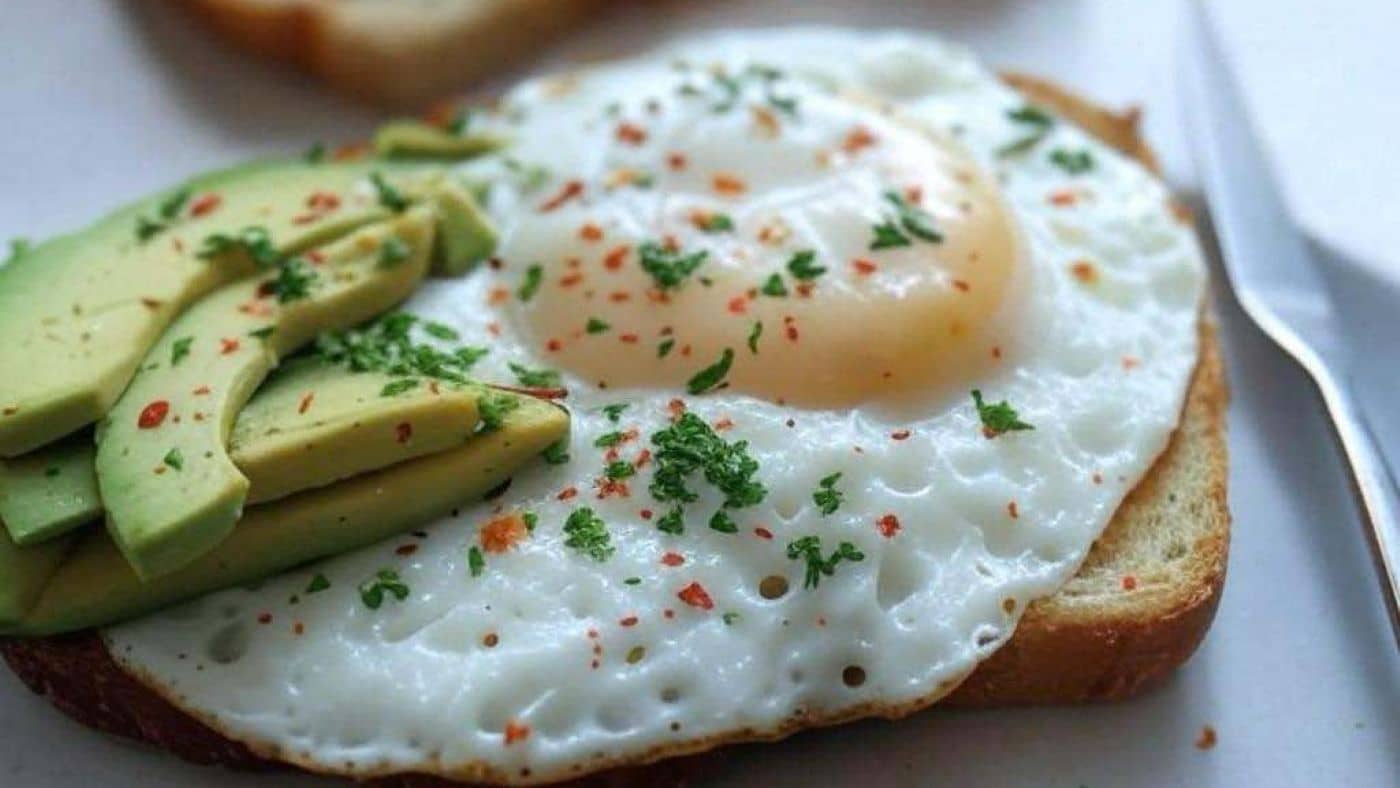Table of Contents
Eggs are one of the most versatile foods on the planet. You can boil them, scramble them, fry them, or even bake them into delicious dishes. But have you ever wondered if the way you cook your eggs affects their nutritional value? Specifically, are over hard eggs a healthy choice?
If you’re someone who loves a fully cooked yolk with zero runniness, this article is for you. We’ll dive deep into the nutrition, benefits, concerns, and best ways to enjoy over hard eggs without compromising health. Ready? Let’s crack this topic open! 🥚
What Are Over Hard Eggs?
Over hard eggs are simply fried eggs where both the white and yolk are completely cooked. Unlike sunny-side-up eggs, which have a runny yolk, or over-easy eggs, which are lightly flipped, over hard eggs are flipped and fried until the yolk is firm.

How Over Hard Eggs Differ from Other Egg Styles
Not all fried eggs are created equal! Here’s a quick comparison:
| Egg Style | Cooking Method | Yolk Consistency |
|---|---|---|
| Sunny-Side Up | Fried on one side, never flipped | Runny |
| Over Easy | Fried, flipped briefly, yolk slightly runny | Slightly Runny |
| Over Medium | Fried, flipped, yolk partially cooked | Soft but Thick |
| Over Hard | Fried, flipped, yolk completely cooked | Firm and Dry |
How Over Hard Eggs Are Cooked
Cooking over hard eggs is simple and requires only a few basic ingredients:
Ingredients:
- 1-2 fresh eggs 🥚
- 1 teaspoon cooking oil or butter 🧈
- A pinch of salt 🧂
- A pinch of black pepper (optional)
Instructions:
- Heat a non-stick skillet over medium heat. Add oil or butter.
- Crack the eggs into the skillet, keeping the yolks intact.
- Cook for about 2-3 minutes, until the whites start to set.
- Carefully flip the eggs and cook for another 2 minutes until the yolk is completely firm.
- Season with salt and pepper, and serve hot. 🍽️
Now that you know how to make them, let’s dive into the nutritional value of over hard eggs!
Nutritional Value of Over Hard Eggs
Eggs are nutritional powerhouses, but does frying them until the yolk is firm affect their health benefits? Let’s break it down.
Macronutrients: Protein, Fats, and Carbs
Here’s a nutrition breakdown for one large over hard egg (50g):
| Nutrient | Amount per Egg | % Daily Value (DV) |
|---|---|---|
| Calories | ~77 kcal | 4% |
| Protein | ~6.3g | 13% |
| Total Fat | ~5g | 7% |
| Saturated Fat | ~1.6g | 8% |
| Carbohydrates | ~0.6g | 0% |
| Fiber | 0g | 0% |
Key Takeaways
- High in protein: Eggs are a complete protein source, meaning they contain all nine essential amino acids.
- Healthy fats: The fat content in eggs supports brain function, hormone production, and energy levels.
- Low carbs: Over hard eggs are virtually carb-free, making them an excellent choice for low-carb and keto diets.
Vitamins and Minerals in Over Hard Eggs
Eggs provide an impressive range of essential vitamins and minerals, including:
| Vitamin/Mineral | Benefit | % DV per Egg |
|---|---|---|
| Vitamin B12 | Brain and nerve health 🧠 | 23% |
| Vitamin D | Bone health, immune system 💪 | 10% |
| Choline | Memory, metabolism 🧠🔥 | 27% |
| Iron | Red blood cell production 🩸 | 5% |
| Selenium | Antioxidant, thyroid function 🔬 | 22% |
Did You Know? 🤔
Egg yolks are one of the richest sources of choline, a vital nutrient for brain development and liver function!
Cholesterol Content: Should You Be Concerned?
One large egg contains about 186 mg of cholesterol, all found in the yolk. For years, eggs were demonized for their cholesterol content, but recent studies show dietary cholesterol doesn’t necessarily raise blood cholesterol levels for most people.
Fact: The real culprits behind high cholesterol are trans fats and excessive saturated fat from processed foods, not eggs!
Still, if you have high cholesterol or heart disease risk, it’s best to consume eggs in moderation and balance them with other heart-healthy foods.
Are Over Hard Eggs Healthy?
Now that we’ve covered the nutritional value of over hard eggs, let’s get to the big question: Are they actually healthy?
Like most foods, the healthiness of over hard eggs depends on how they’re cooked, how often you eat them, and what you pair them with. Let’s explore the benefits and potential downsides to see if over hard eggs deserve a place on your plate.
Health Benefits of Over Hard Eggs
Despite their firm yolks, over hard eggs still pack a serious nutritional punch. Here are some of the biggest health benefits:
1. Excellent Source of High-Quality Protein
Protein is the building block of life, and eggs are one of the best sources out there. One over hard egg contains 6-7 grams of complete protein, meaning it provides all nine essential amino acids your body needs.
Why is this important?
- Supports muscle growth and repair 💪
- Keeps you full for longer, reducing hunger cravings 🍽️
- Boosts immune function and metabolism
This makes over hard eggs an excellent choice for athletes, growing teens, and anyone trying to build or maintain muscle.
2. Rich in Brain-Boosting Nutrients
Eggs aren’t just good for your body—they’re great for your brain too! The yolk contains choline, a nutrient that plays a key role in memory, mood, and cognitive function.
Fun Fact: Studies show that higher choline intake is linked to better brain health and a lower risk of cognitive decline.
So if you want to stay sharp and focused, adding eggs to your diet is a smart move.
3. Supports Heart Health (When Eaten in Moderation)
Eggs have long been misunderstood when it comes to heart health. While they do contain cholesterol, research suggests that for most people, eggs do not raise the risk of heart disease.
Here’s why eggs can actually benefit your heart:
✅ Omega-3 fatty acids in eggs help reduce inflammation 🐟
✅ Lutein and zeaxanthin protect against heart disease 🥬
✅ Protein helps regulate blood sugar levels, reducing diabetes risk
That said, how you cook your eggs matters! Frying eggs in butter or processed oils can counteract these heart-healthy benefits.
4. Great for Weight Loss and Metabolism
If you’re trying to lose weight, over hard eggs can be your best friend.
Why?
- High in protein → Keeps you full longer
- Low in calories → Won’t add unnecessary weight
- Boosts metabolism → Helps burn more calories
Did You Know? A study found that people who eat eggs for breakfast feel fuller and consume fewer calories throughout the day compared to those who eat a high-carb breakfast.
Potential Downsides and Health Concerns
While over hard eggs offer plenty of benefits, they do have a few potential downsides—especially if they’re not cooked properly.
1. Nutrient Loss Due to Overcooking
Egg yolks contain important nutrients like vitamin B12, folate, and antioxidants. However, when eggs are cooked at high temperatures for too long, some of these nutrients break down.
Solution: Try cooking over hard eggs on low to medium heat to retain more nutrients.
2. Increased Cholesterol Oxidation
When eggs are fried at high temperatures, the cholesterol in the yolk can oxidize, leading to the formation of harmful compounds linked to inflammation and heart disease.
How to Avoid This?
- Use gentle cooking methods (avoid high heat).
- Cook with heart-healthy oils like olive oil instead of butter or processed oils.
3. Harder Texture and Dryness
One common complaint about over hard eggs? They can be dry and rubbery! Since the yolk is fully cooked, it loses its creamy, rich texture that makes other egg styles so delicious.
Pro Tip: To avoid rubbery eggs, cook them on low heat and add a splash of water to the pan for moisture.
How to Make Over Hard Eggs Healthier
Love over hard eggs but want to maximize their health benefits? Here are some simple ways to make them even healthier.

Choosing the Right Cooking Oil
Not all oils are created equal! Cooking your eggs in the wrong oil can turn a healthy meal into a not-so-healthy one.
| Oil Type | Health Rating 🌟 (1-5) | Why? |
|---|---|---|
| Olive Oil | ⭐⭐⭐⭐⭐ (Best) | Heart-healthy, rich in antioxidants |
| Avocado Oil | ⭐⭐⭐⭐⭐ (Best) | High smoke point, great for frying |
| Butter | ⭐⭐⭐ (Okay) | Tasty but high in saturated fat |
| Vegetable Oil | ⭐ (Avoid) | High in processed fats and inflammation |
If you want the healthiest option, go for olive oil or avocado oil! 🥑
Pairing Over Hard Eggs with Healthy Foods
To get the most out of your eggs, pair them with nutrient-dense foods instead of processed carbs.
Great combos:
–Over hard eggs + avocado toast → Healthy fats + fiber
–Over hard eggs + steamed veggies → Protein + vitamins
–Over hard eggs + sweet potatoes → Balanced energy boost
Not-so-great combos:
–Eggs + sugary pastries → Blood sugar spike
–Eggs + white toast + processed meats → Unhealthy fats + refined carbs
Using Lower Heat for Cooking
If you want to preserve the nutrients in your eggs, avoid high heat cooking.
Better cooking methods:
✅ Low-medium heat → Retains nutrients
✅ Non-stick pan → Requires less oil
✅ Lid on the pan → Helps cook evenly without overcooking
This way, you can enjoy over hard eggs without sacrificing nutrition!
Are Over Hard Eggs Good for Weight Loss?
If you’re trying to lose weight, you might be wondering: Are over hard eggs a good choice for shedding those extra pounds? The short answer? Yes! 🥚
Satiety and Protein Benefits
One of the biggest challenges when losing weight is controlling hunger. Over hard eggs are:
✅ High in protein → Keeps you full for hours
✅ Low in calories → No unnecessary weight gain
✅ Slow-digesting → Prevents energy crashes
Fact: Studies show that eating a protein-rich breakfast, like eggs, reduces overall calorie intake throughout the day.
Comparison with Other Egg Preparations for Weight Loss
Not all egg styles are equally effective for weight loss. Here’s a comparison:
| Egg Style | Calories (Per Large Egg) | Satiety Level | Best for Weight Loss? |
|---|---|---|---|
| Over Hard | 77 kcal | High | ✅ Yes |
| Over Easy | 77 kcal | Moderate | ✅ Yes |
| Scrambled (with butter) | ~100 kcal | Moderate | ⚠️ Maybe (depends on butter amount) |
| Boiled | 77 kcal | Very High | ✅ Best |
Verdict: Over hard eggs are a great weight-loss-friendly option, but boiled eggs might be slightly better since they don’t require oil or butter.
Over Hard Eggs vs. Other Egg Cooking Methods
Now, let’s compare over hard eggs with other popular egg styles.
Over Hard vs. Over Easy Eggs
| Feature | Over Hard 🥚 | Over Easy 🍳 |
|---|---|---|
| Yolk Texture | Fully cooked | Runny |
| Cooking Time | Longer | Shorter |
| Nutritional Value | Slightly lower due to heat exposure | Higher (some nutrients preserved) |
| Health Benefits | Good, but may lose some nutrients | Better nutrient retention |
➡ Winner? Over easy eggs are slightly healthier because the yolk retains more nutrients.
Over Hard vs. Scrambled Eggs
| Feature | Over Hard 🥚 | Scrambled 🍳 |
|---|---|---|
| Yolk Texture | Firm and dry | Soft and fluffy |
| Cooking Fat Needed? | Minimal | Often cooked with butter |
| Nutritional Value | Maintained | Can be lower if overcooked |
➡ Winner? It depends! Scrambled eggs are softer but often cooked with butter, which adds extra fat and calories.
Over Hard vs. Boiled Eggs
| Feature | Over Hard 🥚 | Boiled 🥚 |
|---|---|---|
| Cooking Method | Fried in oil/butter | Boiled in water |
| Fat Content | Higher (depends on oil used) | 0g added fat |
| Nutritional Value | Can lose some nutrients due to frying | Best nutrient retention |
➡ Winner? Boiled eggs! Since they don’t require oil or butter, they’re the healthiest option.
Best Ways to Eat Over Hard Eggs
So, how can you enjoy over hard eggs without getting bored? Here are some delicious ideas:
Breakfast Ideas 🍳
- Egg & Avocado Toast – Pair over hard eggs with whole-grain toast and mashed avocado for a balanced meal.
- Egg & Veggie Wrap – Wrap an over hard egg in a whole-wheat tortilla with spinach and tomatoes.
- Protein-Packed Egg Bowl – Serve over hard eggs with quinoa, sautéed greens, and feta cheese.
Lunch and Dinner Pairings 🥗
- Egg & Grilled Chicken Salad – Top a fresh salad with chopped over hard eggs and grilled chicken.
- Egg-Stuffed Sweet Potato – Cut a sweet potato in half, add an over hard egg, and sprinkle with herbs.
- Egg & Avocado Rice Bowl – Serve over hard eggs on a bed of brown rice with avocado slices.
Meal Prep and Storage Tips
- Cook in batches – Make several over hard eggs at once for easy meals during the week.
- Store properly – Keep cooked eggs in the fridge for up to 4 days in an airtight container.
- Reheat the right way – To avoid rubbery eggs, reheat them on low heat in a skillet instead of the microwave.
FAQs About Over Hard Eggs and Egg Health
Is it safe to eat over hard eggs?
Yes, over hard eggs are completely safe to eat because both the egg white and yolk are fully cooked. This eliminates the risk of foodborne illnesses like salmonella, which can sometimes be found in undercooked eggs.
What is the healthiest style of eggs?
The healthiest egg style depends on your dietary needs and cooking method. However, the top two healthiest ways to cook eggs are:
1. Poached Eggs – Cooked in water without oil, preserving nutrients while avoiding unhealthy fats.
2. Boiled Eggs (Soft or Hard-Boiled) – No added fats, and they retain most of their protein, vitamins, and minerals.
Which is healthier, scrambled or over easy eggs?
It depends on how they’re cooked:
- Scrambled eggs can be healthy if cooked with minimal butter or oil. However, adding cheese, cream, or excessive oil can increase calories and saturated fats.
- Over easy eggs are usually healthier if cooked in little or no oil, as the yolk remains soft and retains more nutrients.
Are over-easy eggs healthy for you?
Yes! Over-easy eggs are a great choice because the yolk remains slightly runny, which helps preserve heat-sensitive nutrients like vitamin B12, folate, and antioxidants (lutein & zeaxanthin).
However, if you are pregnant, immunocompromised, or at risk for foodborne illness, it’s best to eat fully cooked eggs to avoid potential risks from raw yolks.
Related Articles You Might Like
If you enjoyed learning about over hard eggs, you might also find these articles helpful:
- Curious about all the different ways to fry an egg? Check out What Are the 4 Types of Fried Eggs? How to Cook Each Perfectly to master your egg-cooking skills.
- Not sure what over hard eggs really mean? Get a full breakdown in What Does Over Hard Eggs Mean? The Ultimate No-Mess Guide.
- Want a foolproof method to cook perfect over hard eggs every time? Follow the step-by-step guide in Over Hard Egg: How to Cook It Right Every Time.
These articles will help you expand your cooking knowledge and perfect your egg-making technique! 🍳🔥
Conclusion: Should You Eat Over Hard Eggs?
So, are over hard eggs healthy? Absolutely—but with a few considerations!
✔ Rich in protein – Great for muscle building & weight loss
✔ Loaded with nutrients – Provides vitamins, minerals & antioxidants
✔ Versatile & filling – Can be enjoyed in many meals
⚠ Watch out for:
- Cooking at too high temperatures (may reduce nutrients)
- Using unhealthy oils (opt for olive or avocado oil instead)
- Eating too many eggs if you have high cholesterol
Now it’s your turn! How do YOU like your eggs? 🍳 Let us know in the comments! 🚀🔥

